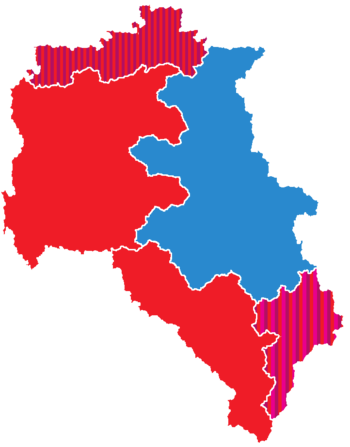2023 Piraean regional elections
| ||
195 seats in the regional parliaments of Foinikas, Sitia, Lampi and Souda Riviera | ||
|---|---|---|
| Registered | 4,474,936 | |
|
| ||
 Regional administrations after the 2020 regional elections PSEE-led government LK-led government PSEE-YLE-coalition government PSEE-YLE-APE-coalition government | ||
Regional elections will be held in Piraea to elect 195 seats in the regional parliaments of 4 regions —Foinikas, Sitia, Lampi and Souda Riviera—, which will conclude with the election of new Minister-Presidents. They will be held simultaneously with the local elections in cities and provinces.
Electoral date
The election day might vary in every region of Piraea, as in some cases, Minister-Presidents might dissolve the regional legislature to serve a new four year-term. This is the case of Samariá, which held elections in 2020 inaugurating a completely new set of four years. In Foinikas, Sitia, Lampi and Souda Riviera, the date must follow the rule of the second Sunday of July.
Campaign
General Council of the Judiciary deadlock
During the final months of 2022, the Minister of Justice, Christoforos Kostopoulos-Kolokotronis, expressed the government's concern for the expiral date of several members of the General Council of the Judiciary, setting a date to produce an agreement with the PSEE that could renovate the mandates.[1] However, during the first months of 2023, the inability of the People's Party and the PSEE to dialogue, elevated the tensions between the two forces.
Following the election of the Presidency of Piraea —in which the PSEE was not able to reach the votes for its candidates in the Senate—,[2] a number of socialist members of the senate grouped together to ask the dismissal of Eleftheria Rodiales from the General Secretary of the party.[3] A month later, the party chose the former Minister of Infrastructure during the Panopoulos government, Antonis Moustakopoulos, to succeed Rodiales [4] amid record lows in opinion polls. [5]
In March, the situation of the magistrature covered headlines once again, after a number of negotiations between the two parties failed and the conservative magistrate Romulos Kapos-Tanou renounced to his position denouncing a lack of credibility in the institution and the harm of the deadlock.[6] The People's Party accused the opposition from blocking a crucial institution, while the PSEE considered the LK conditions for renovation unfavourable for state of law adding that the conservative party was changing judges to their own benefit. The crisis forced the Presidency to mediate between the two, and draft a possible route map to elect the new members of the magistrature as well as change the law through which judges get to be chosen.[7]
Pre-campaign period
In the period prior to the beginning of the official campaign, political parties and government started sending their messages to their possible electorates and the polarisation of national politics was introduced into the regional sphere. The pre-campaign period was marked, not only by the judicial deadlock, but also by the consolidation of the People's Party post-Percederation, reaffirming the results of the 2022 general election; this hurt the the rest of the centre-right, affecting mostly Democrats, which is in a process of considering merging with the People's Party in a number of regions.[8]
Regional governments
| Region | Current control | New control | ||
|---|---|---|---|---|
| 9 July | ||||
| Foinikas | People's Party (LK) | |||
| Souda Riviera | Piraese Socialist Workers Union (PSEE) | |||
| Sitia | Piraese Socialist Workers Union (PSEE) | |||
| Lampi | Independent Regionalist Union (APE) | |||
| Do not vote | ||||
| Samariá | Green Alternative (PEL) | |||
Participating parties
| Candidacy | Leading candidates Foinikas, Lampi, Sitia, Souda Riviera |
Ideology | Previous result | Gov. | |||||
|---|---|---|---|---|---|---|---|---|---|
| Votes (%) | Seats | ||||||||
| Liberal conservatism Economic liberalism Christian democracy |
— | — | |||||||
| Progressivism Social democracy Secularism Pro-Eucleanism |
— | — | |||||||
| Progressivism Green politics Democratic socialism Socialism Councilism (factions) Pro-Eucleanism |
— | — | |||||||
| Centrist politics Humanism Social liberalism Liberalism Pro-Eucleanism |
— | — | |||||||
| Regionalism Federalism Environmentalism Pro-Eucleanism |
— | — | |||||||
| Centrist politics Anti-corruption Third option Pro-Eucleanism |
— | — | |||||||
| Economic liberalism Social liberalism Centrism Pro-Eucleanism |
— | — | |||||||
| Sotirian Democracy Big-Tent Minority interests Novalian interests Populism |
— | — | |||||||
Overall results
Foinikas
Lampi
Sitia
Souda Riviera
Aftermath
Notes
References
- ↑ Ballakos, Sara (2022-12-20). "The General Council of the Judiciary fails to find key of its renovation". I Naftemporiki.
- ↑ Samaras, Maria Pia (2023-02-12). "The new Presidency, elected amid unprecedented tension". I Naftemporiki.
- ↑ "@INafte". Chirper. 16 February 2023.
- ↑ Parallelis, Kouridis, Dorothea, Herakles (2023-03-24). "The socialist left falls for Antonis Moustakopoulos". I Naftemporiki.
- ↑ Samaras, Antonis (2023-03-16). "LK sorpasso consolidates party's line in government". I Naftemporiki.
- ↑ Samaras, Antonis (2023-03-24). "The renounce of Kapos-Tanou deepens the crisis inside the General Council of the Judiciary". I Naftemporiki.
- ↑ Parallelis, Kouridis, Dorothea, Herakles (2023-03-30). "The Presidency chooses to mediate in the General Council of the Judiciary". I Naftemporiki.
- ↑ Tarssouti-Lakis, Aristotelis (2023-05-04). "Theodoreas stages the possibilities of a Democrats merge with LK". I Naftemporiki.
























